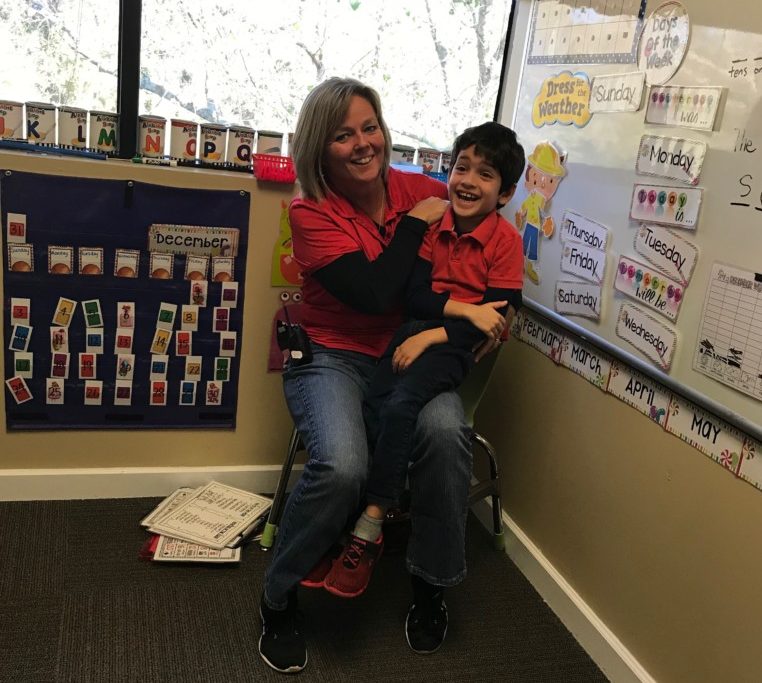
Editor’s note: redefinED is supporting National Autism Awareness Month each Saturday in April by reposting articles from our archives that celebrate those who champion the educational rights of children with autism. Today’s post, which originally appeared in June 2018, features a dedicated teacher who refused to give up on a child with profound autism.
By Livi Stanford
Abigail Maass never spoke. It was hard for her to connect with others. She grew impatient easily.
Her struggles mirrored those of children everywhere who grow up with profound autism.
This all changed when she met Trina Middleton, a teacher with Duval County Public Schools.
Middleton said she consistently encouraged Abigail and gave her many opportunities to do different activities. She also enrolled her in intensive Applied Behavioral Analysis therapy. ABA is a therapeutic approach that helps people with autism improve their communication, social and academic skills.
“It is just believing in her abilities and supporting her and celebrating with her,” she said.
Priscilla Maass, Abigail’s mother, said Middleton’s belief in her daughter made all the difference.
“She is patient but is firm and the kids react to that,” she said. “She can think outside the box. She can come up with different techniques.”
 According to Maass, Abigail has grown substantially in the 10 years that she has worked with Middleton, who now serves as the education director of the Jacksonville School for Autism.
According to Maass, Abigail has grown substantially in the 10 years that she has worked with Middleton, who now serves as the education director of the Jacksonville School for Autism.
Now, Abigail, 12, can use some sign language to communicate, especially about her feelings. She uses her iPad more frequently as a communication device. She finds productive activities at her school, such as helping in the lunchroom. She is also now able to feed herself.
Maass said that in Middleton, Abigail has found an educator she trusts.
“She gets her out of her shell,” she said. “She does not get offended when Abigail will tell her to go. When she needs someone to rely on, Abigail tends to go toward Trina.”
Parents and administrators describe Middleton as dedicating her life to children with special needs. At the Jacksonville School for Autism, Middleton has been credited with expanding classroom programs and for developing a bridge program with the goal of helping transition students from JSA into typical learning environments.
“She is the voice of calm in the storm of Autism for our families and staff, and her presence simply makes everyone in our school program more confident in their capabilities,” said Michelle Dunham, JSA’s executive director. “A true testament to her strength as a leader can be seen in the relationships she maintains today with so many teachers she worked within both public school and JSA.”
Middleton began her career in 1993, teaching emotionally disturbed children in St. Johns County.
She took some time away from teaching to raise her own children. In 2003, she began teaching at Duval County Schools. After four years, she became a site coach for schools that have self-contained classes for students with autism.
That lasted until 2012, when massive budget cuts were made to the school budget.
Middleton said she could not look her parents in the eyes and tell them their children were getting all they needed. She felt the budget cuts fell disproportionately on special needs programs.
The cuts, implemented in 2011, affected classroom curriculum and supplies as well as direct services in speech/language and occupational therapies. They also affected training for staff who worked with children with autism in the classroom.
Student-to-teacher ratios rose, sometimes 5 to 1 in self-contained classrooms, Middleton said.
And she had other ideas about how to change education for students with special needs. She wanted more instructional flexibility than the public school allowed.
“Students’ self-regulation and communication needs to be the focus prior to the focus being on academic areas,” Middleton said.
After learning of the budget cuts, Middleton decided to change course. She took a job at the Jacksonville School of Autism, a nonprofit K-12 educational center for children ages 2-22 with Autism Spectrum Disorder — a neurological condition characterized by a wide range of symptoms that often include challenges with social skills, repetitive behavior, speech and communication.
Founded by Dunham and her husband, the school continues to thrive with 51 students and 50 therapists and classroom teachers. The school also implemented a vocational training program for older students to help them acquire skills to become gainfully employed.
Serving as educational director, Middleton said she is most proud of her ability to establish a strong collaborative relationship between the school’s classroom and clinical staff, tailoring instruction to overcome each student’s individual challenges.
She frequently brings the entire clinical and classroom teams together to discuss students’ needs and progress.
Asked what is the most important thing that educators must do when they teach those with autism, Middleton said it is essential to respect them as human beings with intellectual capacities that far exceed their ability to communicate.
Students like Abigail Maas can attest.


